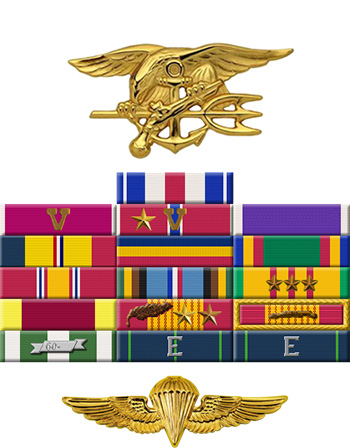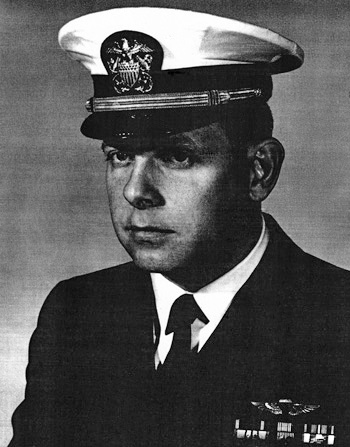Frederick Trani was born on July 11, 1940, in Lowville, New York. He enlisted in the U.S. Navy on February 27, 1958, and entered the U.S. Naval Academy in July 1959. Trani graduated and was commissioned an Ensign on June 5, 1963, and served aboard the destroyer USS Fechteler (DD-870) before beginning training to become a Navy SEAL. After completing SEAL training, he was assigned to SEAL Team 2, where he served with the Delta River Patrol Group in the Republic of Vietnam from May 1966 until he died from wounds received as the result of a booby trap on September 26, 1968. Frederick Trani was buried at Saint Peters Cemetery in Poughkeepsie, New York.
His Silver Star Citation reads:
For conspicuous gallantry and intrepidity in action while serving with friendly foreign forces engaged in armed conflict against Communist insurgent forces on the hostile island of Cu Lao Dung, Ba Xuyen Province, Republic of Vietnam, on 26 July 1967. While leading a small combat patrol, Lieutenant Trani, serving with SEAL Team Detachment Alpha, encountered and subsequently was surrounded by a numerically superior enemy force. Unable to maneuver out of the enemy encirclement, Lieutenant Trani attempted to contact supporting helicopters by radio, but before he could effectively communicate his unit's position, he experienced radio failure. Undaunted by the lack of communications with supporting arms, he maneuvered his small unit into a tight defensive position. Though pinned down by constant enemy automatic weapons and rifle fire in a position that afforded only minimal protection for himself and his squad, and despite growing uncertainty of the arrival of assistance, Lieutenant Trani courageously moved among his men and succeeded in keeping morale high. Faced with a limited supply of ammunition and the imminent threat of a coordinated enemy attack that might easily overrun his small unit, he methodically employed every conceivable means to attract the attention of armed helicopters which he could hear operating in the distance. Four unnerving hours passed before the armed helicopters arrived to assist his beleaguered unit. Able to employ only primitive methods, he succeeded in marking his position for the helicopters and directed their fire onto part of the Viet Cong forces surrounding him. He directed another helicopter to a safe location to land for extraction of his unit. He then organized his men and maneuvered them under continuing enemy fire to the extraction craft without casualties or loss of a prisoner who later yielded valuable intelligence information. Through his exemplary and professional leadership, unwavering courage under fire and inspiring conduct throughout a desperate situation, Lieutenant Trani upheld the highest traditions of the United States Naval Service.
|



